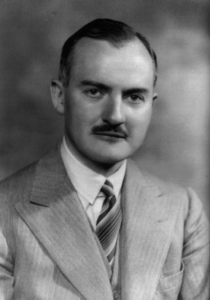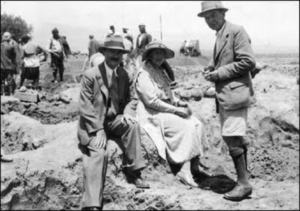
Poirot Score: 95
Murder on the Orient Express
☆☆☆☆☆
Reasons for the Poirot Score
One of Christie’s classic solutions, pushing at the boundaries of the genre. If through an act of inspiration the correct solution is guessed then so much falls into place that one can be sure that it is the correct solution. But no one clue is sufficient, and the daring nature of the solution together with the various misdirections and red herrings help prevent readers from seeing the truth. Worth a very high score for the whodunnit puzzle alone. But Orient Express is also a very good read. Some of the characters are great fun and Christie manages to make drama from the collecting of evidence and the intellectual act of trying to solve the puzzle. A twist of exoticism and the magic of rail travel across Europe between the wars and we have all the ingredients of an absolutely first class entertainment.
Click here for full review (spoilers ahead)
Trivia
Dedication
“To M.E.L.M Arpachya, 1933”
M.E.L.M is Max Edgar Lucien Mallowan, Agatha Christie’s second husband. Christie developed an interest in archaeology in the 1920s. Leonard Woolley began his excavations at Ur, Mesopotamia (in modern Iraq) in 1922. Woolley’s wife, Katherine, was a fan of Christie’s novel The Murder of Roger Ackroyd (published 1926). Christie went to Ur as a guest of Woolley’s in 1928 and again in February 1930. It was on this second visit to Ur when she met Max Mallowan, aged 25 years (Christie was 39 years old). Mallowan had been an undergraduate at New College, Oxford at the same time as Christie’s nephew, Jack Watts. Agatha Christie and Max Mallowan were married in September 1930. They remained married until she died in 1976. He died in 1978 at the age of 74. Mallowan was a distinguished archaelogist and was knighted in 1968 three years before Christie was ‘knighted’ (became a Dame) in 1971. Arpachya is an archaeological site in Mesopotamia (in modern Iraq) that was first excavated by Max Mallowan (with Agatha Christie) in 1933.
Max Mallowan in 1934
http://www.schechhamad.de/bildergalerie/
forschungsgeschichte/03.php
Mr Harris, Dickens, and Mrs Harris
‘No. 7 berth – second class. The gentleman has not yet come, and it is four minutes to nine.’
‘Who is it?’
‘An Englishman,’ the conductor consulted his list. A. M. Harris.’
‘A name of good omen,’ said Poirot. ‘I read my Dickens. M. Harris, he will not arrive.’ [Chapter 2]
And Poirot is right. A.M. Harris does not arrive because he does not exist. Poirot’s memory of Dickens is impressive, although he is presumably referring to a Mrs Harris in the novel Martin Chuzzlewit. Sarah (Sairey) Gamp makes frequent reference to a Mrs Harris, quoting her and apparently talking with her. But Mrs Harris is a figment of Mrs Gamp’s imagination. There are a few Mr Harris’s in Dickens’ works but none account for Poirot’s remark. Christie refers to Mrs Gamp in Murder in Mesopotamia and in Sad Cypress, and to Mrs Harris in Peril at End House and They came to Bagdad (see http://thesecondsentence.blogspot.co.uk/2013/04/the-further-adventures-of-martin.html)
Agatha Christie and the Orient Express
Christie first travelled on the Orient Express in 1928 on her way to Baghdad – the journey that took her to Ur where she became the guest of Leonard Woolley (see Dedication above). In 1931 Max Mallowan was working at Nineveh with Campbell Thompson. In December Agatha Christie travelled back to England by herself on the Orient Express. She described the journey in a letter to Max Mallowan. At 3am, the morning after leaving Stamboul (Istanbul), the train stopped for a whole day because of flooding on the line. Most of us become irritated if a train is delayed for more than ten minutes. Christie, however, turned this irritation into gold. She observed her fellow passengers and overheard their conversations. She wondered how these people could be transformed into the connected characters of a novel, and she went on to write one of the greatest ever whodunnits.
“A chatty breakfast in the dining car ensued. ‘All boys together’ spirit! There was an elderly American lady … a funny little Englishman from Smyrna … an old gentleman of 85 with a most amusing wife of 70 with a hideous but very attractive face … they were some of the richest people in Istanbul… Sitting with them was a Hungarian Minister and his wife… There were also two Danish lady missionaries. ..There was also, most fortunately, a director of the Wagons Lit Company. The American lady …wept bitterly. ‘My daughter said I’d have no trouble at all …I’ve never travelled in Europe before and I’ll never travel in it again. …. A peaceful night except for the Turk who was next door to me and was continuously trying to open the door between our compartments – not, let us hope, for the worst reasons but I think because he thought it was the wash place!!” [quoted in Janet Morgan’s biography, chapter 15]
Max Mallowen, Agatha Christie and Leonard Woolley in ?1930 at Ur
http://agathachristie1.blogspot.co.uk/2009/12/sir-max-mallowan.html



